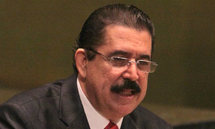
Zelaya's surprise return on September 21 -- to the Brazilian embassy, where he is currently holed up -- triggered a new wave of protests and a clampdown on civil rights, but also boosted efforts to break the deadlock.
"We're being charged with sedition because we are calling for the return of our president to end all this," said Ramon Diaz, 43, one of the hunger strikers being held at the National Penitentiary in Tegucigalpa.
"The lawyers have said that they want to lock us up for the maximum term, 10 years," Diaz told AFP from the prison, located just outside the capital.
Diaz and 54 other Zeyala sympathizers were arrested Wednesday after police and soldiers violently ousted protesters from government offices they had taken over. Some of the protesters, including women and children, were released.
The farmer-protesters say they took over the office in an attempt to have their land rights respected: as president, Zelaya moved towards granting land to some 300,000 farmers that have been demanding plots for some 40 years.
"We are starting a hunger strike to demand a just trial, the restitution of president Zelaya, and respect for our right to the land," said Benedicto Flores, 48, another jailed farmer.
The prison was built for 1,500 inmates, but currently has a population of 2,655, including the farmers, according to prison data.
The farmers "were charged with sedition and will go for a preliminary hearing on Tuesday," prison warden Miguel Alberto Ponce told AFP.
Separately, a high-level Organization of American States committee led by John Biehl, a veteran diplomat and representative of OAS Secretary General Jose Miguel Insulza, continued work Saturday to pave the way for talks next week.
The interim regime, which has accused Zelaya of treason, corruption and abuse of authority, said that a mediation plan devised by Costa Rican President Oscar Arias could become an "acceptable agreement" with some changes.
The Arias plan calls for Zelaya to return to power, something that Micheletti has repeatedly rejected.
With negotiations looming, riot police are cracking down on demonstrators and breaking up protests daily.
Under the sweeping new powers, baton-wielding riot police and soldiers have evicted Zelaya supporters who had been camping out in the capital this week.
At one Saturday protest in the working class neighborhood of El Pedregal, hundreds gathered to demand a return of civil liberties, and the reopening of Radio Globo and Canal 36, two opposition news outlets that the regime closed down.
Cracks appeared in the Micheletti regime over the clampdown amid concern that it would derail the November 29 elections.
---------------------------------------------------------------------------------------------------------------------------------
"We're being charged with sedition because we are calling for the return of our president to end all this," said Ramon Diaz, 43, one of the hunger strikers being held at the National Penitentiary in Tegucigalpa.
"The lawyers have said that they want to lock us up for the maximum term, 10 years," Diaz told AFP from the prison, located just outside the capital.
Diaz and 54 other Zeyala sympathizers were arrested Wednesday after police and soldiers violently ousted protesters from government offices they had taken over. Some of the protesters, including women and children, were released.
The farmer-protesters say they took over the office in an attempt to have their land rights respected: as president, Zelaya moved towards granting land to some 300,000 farmers that have been demanding plots for some 40 years.
"We are starting a hunger strike to demand a just trial, the restitution of president Zelaya, and respect for our right to the land," said Benedicto Flores, 48, another jailed farmer.
The prison was built for 1,500 inmates, but currently has a population of 2,655, including the farmers, according to prison data.
The farmers "were charged with sedition and will go for a preliminary hearing on Tuesday," prison warden Miguel Alberto Ponce told AFP.
Separately, a high-level Organization of American States committee led by John Biehl, a veteran diplomat and representative of OAS Secretary General Jose Miguel Insulza, continued work Saturday to pave the way for talks next week.
The interim regime, which has accused Zelaya of treason, corruption and abuse of authority, said that a mediation plan devised by Costa Rican President Oscar Arias could become an "acceptable agreement" with some changes.
The Arias plan calls for Zelaya to return to power, something that Micheletti has repeatedly rejected.
With negotiations looming, riot police are cracking down on demonstrators and breaking up protests daily.
Under the sweeping new powers, baton-wielding riot police and soldiers have evicted Zelaya supporters who had been camping out in the capital this week.
At one Saturday protest in the working class neighborhood of El Pedregal, hundreds gathered to demand a return of civil liberties, and the reopening of Radio Globo and Canal 36, two opposition news outlets that the regime closed down.
Cracks appeared in the Micheletti regime over the clampdown amid concern that it would derail the November 29 elections.
---------------------------------------------------------------------------------------------------------------------------------









 Home
Home Politics
Politics









